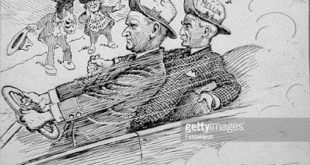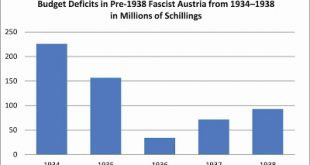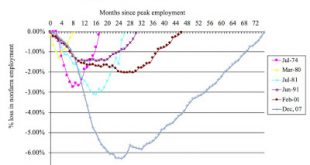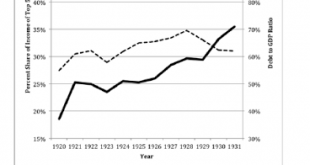Calvin Coolidge and Andrew Mellon A new paper by Ahmad Borazan on the 1920-21 recession, often seen in libertarian and Austrian circles as an example of a laissez-faire recovery. From the abstract:The US recovery from the 1920–21 recession has been presented as a triumph of laissez-faire policies and a serious challenge to Keynesian economics. This study interrogates this claim by using previously unutilised data and examines the historical development of the early 1920s recession and...
Read More »Keynes’ Life: 1931
I give an account below of Keynes life in 1931.January–May 1931 On 27 January 1931, Friedrich Hayek arrived in London at the London School of Economics (LSE). Hayek gave four evening lectures at 5 p.m. from 27 to 30 January 1931 on “Prices and Production” (Howson 2011: 196), and these lectures were later published in England as the book Prices and Production (September 1931), an exposition of the Austrian Business Cycle Theory (ABCT). Hayek himself had returned to Austria by 14 February...
Read More »Keynes’ Life: 1930
I give an account below of Keynes life in 1930, the second year of the Great Depression.January–May 1930 In January 1930, the second Hague Conference adopted the Young Plan on German reparations, and, as we saw in the last post, Keynes had corresponded with the leading members on the issue of German reparations. By early 1930, Keynes was beginning to think that an international slump was a possibility (Moggridge 1992: 483).On 19 January 1930, Keynes’ friend Frank Plumpton Ramsey died after...
Read More »Keynes’ Life: 1929
I give an account below of Keynes life in 1929, the year in which the Great Depression began.January–May 1929 Keynes taught at Cambridge in the first half of the year. The teaching periods at Cambridge were divided into three terms:October–December – Michaelmas January–March – Lent or January term April–June – Easter term.On 18 January 1929, Ludwig Wittgenstein returned to Cambridge, and Keynes met him when he arrived, and allowed Wittgenstein to share his rooms at Cambridge until February...
Read More »Austerity in Pre-1938 Fascist Austria
From 1933 to 11 March 1938, Austria was ruled by the clerical fascist Fatherland Front in a regime called the Austrian Federal State.The two dictators of Austria in this period were as follows:Dictators of the Austrian Federal State 5 March 1933–25 July 1934 – Engelbert Dollfuss 29 July 1934–11 March 1938 – Kurt SchuschniggAlthough the Fatherland Front had some anti-capitalist elements, the fact is that in power Engelbert Dollfuss and Kurt Schuschnigg pursued spending cuts, austerity, budget...
Read More »Matt Stoller — The Bailouts for the Rich Are Why America Is So Screwed Right Now
Comparison of the way Bush and Obama handled the 2008 crisis with now Hoover and Roosevelt handled the crisis that led to the Great Depression.ViceThe Bailouts for the Rich Are Why America Is So Screwed Right Now Matt Stoller
Read More »Employment losses in historical perspective
My colleague Chris Magee sent this graphs around about employment losses during different recessions. The first one below show all the recession from the 1970s onwards. The next one, which I modified to show just the Great Recession and the Great Depression, is below, and gives a sense of the dimension of the Depression. The sheer size of the Depression is impressive. Even though the last recession is an outlier, it pales in comparison with the Great Depression. You can see in the graph...
Read More »Keynes’ intellectual influence: the theorist vs the pamphleteer
Keynes' 1933 and 1929 pamphlets, respectively One of the many unfair criticisms of Keynes' General Theory (GT) is that is badly written or somewhat incomprehensible. Note that Keynes started to write it in 1932, four years into the Depression, and two years after publishing the Treatise, which he probably thought was going to be his Magnus Opus. In other words, by the time he started to write the GT the worst part of the Depression was coming to an end (the UK had abandoned gold in 1931, and...
Read More »Has this happened before?
So I have discussed this before. The idea that the Great Depression bears a resemblance to the Great Recession, in that in both cases income inequality increased in the previous period, and went hand in hand with debt accumulation. I cited the Barba and Pivetti paper for the more recent event, and the work by my student Ahmad Borazan on the previous case (see also this post). Now I've been reading Matthew Drennan's book on Income Inequality, and he shows the following figure. In the same...
Read More »Stefan Molyneux’s Libertarian Myths on the Great Depression
These myths can be seen in the video below of Stefan Molyneux’s interview of Lawrence W. Reed on the Great Depression.[embedded content]A quick point that struck me: both seem oblivious to the fact that Keynesian economists do not advocate tax increases in a recession or depression. This doesn’t inspire much confidence in the quality of the analysis.In what follows, I am using a Post Keynesian economic analysis to critique the economic theory underlying the discussion in this video, which...
Read More » Heterodox
Heterodox





